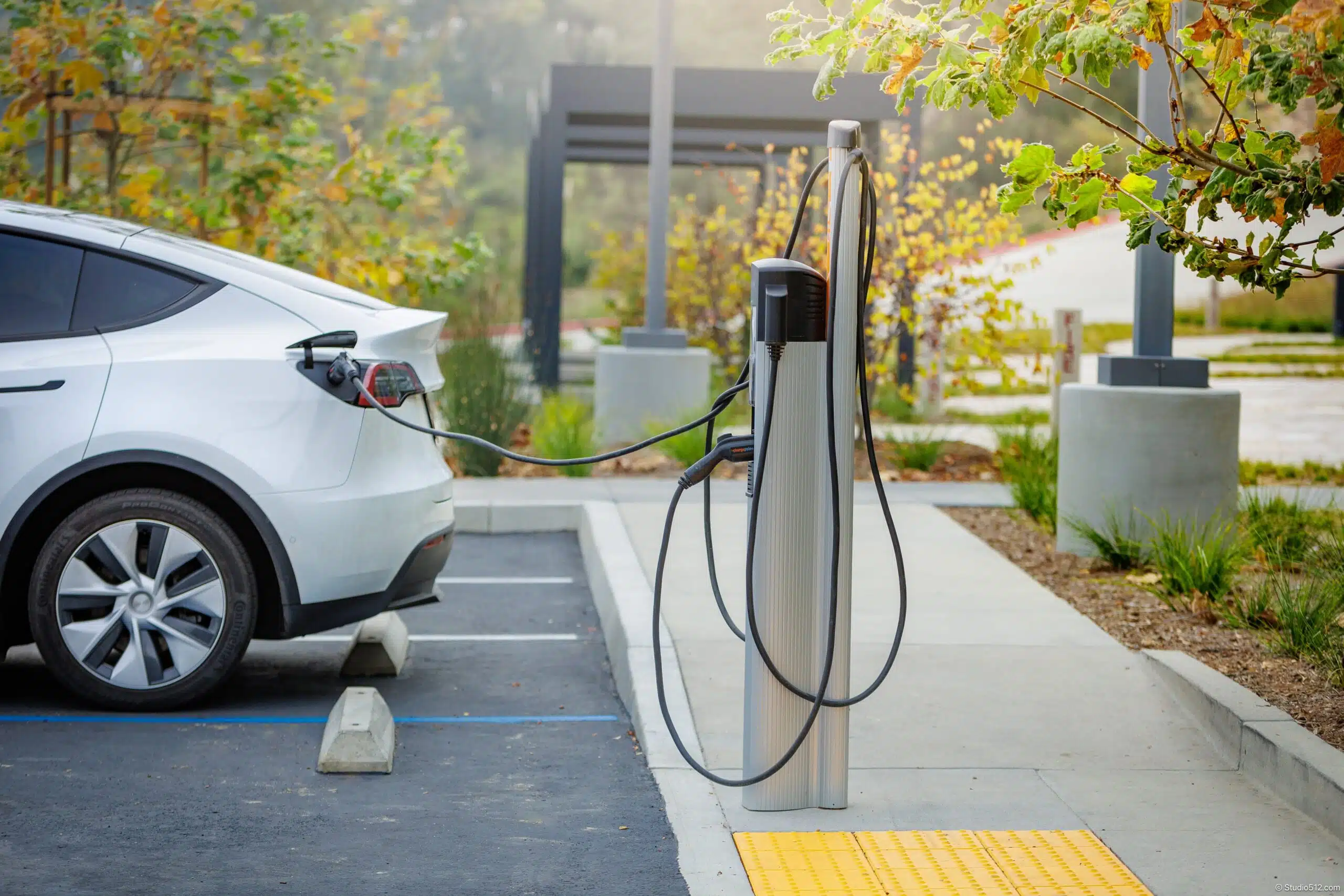- December 4, 2024
- Perspectives, Trending Topics
Technology, Zero-Emission Transportation, and Telecom: Partnership Opportunities Across Industry Networks


Jose Correa, PE
Zero-Emission Vehicle Consultant

Matt Fleck
Telecom Professional

Roger Garza, PE
Telecom Engineer

Matt Selkirk, PE
Zero-Emission Vehicle Consultant
Both the zero-emission vehicle (ZEV) and telecom industries are experiencing rapid evolution and are teeming with opportunities. Learn more about industry outlooks and how multidisciplinary experts can leverage their skills to lead the way forward in our increasingly interconnected world.
What are Emerging Opportunities in ZEV?
One of the major opportunities in ZEV today is cultivating a more consistently satisfactory user experience—this includes creating more reliable ZEVs that people feel confident taking on longer trips and deploying charging infrastructure at convenient locations with enhanced amenities. The industry has trended towards charging hub style projects that do not simply deploy chargers at existing amenities, but instead develop new amenities to service chargers. Additionally, ZEV experts are focused on streamlining user interactions with charging infrastructure and making interfaces easier to use.
Along with the individualized consumer experience, there are ZEV opportunities for fleet transitions—including fleets of long-haul trucks, package delivery vans, and commuter buses. ZEV experts can partner with operators to strategize fleet deployments, plan routes efficiently, and calculate how many charging assets they will need to support fleets and maintain similar route and cycle times. Teams of multidisciplinary experts can also help clients make sure that power requirements are met and utilities are prepared to accommodate the grid capacities that ZEV fleets require.
Currently, there is a significant balancing act between deployment and preparedness in the ZEV industry—operators want to take advantage of opportunities to plug into the market while also making sure that deployed technology is future-proof and electric grid supplies are right-sized for the goal. As the industry continues to evolve, shifts in the next five years will likely make the current EV plugs, power supply standards, and infrastructure unrecognizable.
What are Emerging Opportunities in Telecom?
The telecommunications industry is cyclical in nature, with a limited number of operators striving to upgrade their infrastructure, bring on more subscribers, and leverage their networks to gain more revenue. With the seeming slowdown of the telecom industry, clients are reducing work and assessing ways to diversify their businesses for the modern market. Simultaneously, contractors, designers, and project management professionals that operate within telecom spaces are investigating how to leverage their skillsets and pivot to new areas.
Opportunities for telecom practitioners include following industry trends—such as the recent focus on expanding service in rural America and developing new sites in underserved areas—and aligning with where and when clients are working. Since the industry is geographically varied, this alignment requires consultants to be adaptable and forward-thinking to capture industry opportunities.
Another focal point of the telecom industry is “hardening the network,” or adding battery backup to existing network systems. This additional power supply is vital to support people’s communication with family, friends, and emergency responders during natural disasters and power outages, and telecom professionals have an opportunity to make networks more robust to meet this need.
Finally, there are crossover opportunities between the ZEV and telecom industries. As more doors open for ZEV infrastructure development, telecom professionals can leverage their soft skills and technical abilities to enhance amenities and charging infrastructure for electric vehicles.
How Can Telecom Expertise Drive Zero-Emission Vehicle Infrastructure?
As the ZEV industry charges ahead with funding and ridership while the telecom industry simultaneously faces a downturn, there are opportunities for experts in both markets to partner on infrastructure improvements. Telecom engineers can leverage their transferable skills to take on work in transportation and energy, potentially meeting the need for consistent expertise in ZEV.
Leveraging a Programmatic Approach
A programmatic approach to projects—or being able to deliver large quantities of small projects consistently—is one aspect of telecom that could greatly benefit the ZEV industry. Often, ZEV experts have dozens of similar projects concurrently, and they must account for intrinsic differences between sites and clients and deliver high-level project management across varying scopes of work. Often, this requires oversight on multidisciplinary projects across the region or even across the nation. Regardless of the area, number of projects, or regulatory environment, our clients expect quality, responsiveness, and consistency of deliverables across projects—a service that telecom professionals are used to providing.
Increasing Cell and Internet Connectivity
The length of time it takes to charge a ZEV compared to the time it takes to fill a tank of gas is changing the way customers interact with charging infrastructure and the space around it. For instance, cell phone coverage is a significant differentiator between charging areas. Many ZEV stations are in residential areas with good cell coverage, but an opportunity exists to expand this coverage into areas with minimal connectivity, supporting people’s confidence to take their ZEVs on longer, cross-country trips. Robust cell coverage can also permit customers to check the health of their vehicles at the charging site and perform needed updates without depending on manufacturers. Additionally, telecom experts can partner with ZEV consultants to integrate open access Wi-Fi networks at EV charging stations—adding appeal for particular charging sites.
Enhancing Connected Vehicle Infrastructure
As technology continues to advance, connected vehicle infrastructure is bringing telecom and Intelligent Transportation Systems together to serve the ZEV industry. A more distributed network—complete with sensors, cameras, and monitors all communicating with each other and with vehicles—is projected to support enhanced autonomy and improve safety and efficiency for multimodal transportation. Furthermore, this connected vehicle infrastructure and the way it will integrate with ZEVs provides an open door for telecom professionals to lead the way with a revolutionary vehicle-to-everything network.
Understanding Funding and Requirements
For ZEV projects that are federally funded or backed by certain grants, consultants and contractors must have certain EV-specific qualifications; however, this is not necessary for all projects. For instance, there are privately-funded projects that only require a regular electrician’s license or a master’s electrician certification—opening opportunities for consultants looking to expand their work into the ZEV market. Additionally, there are financial incentives for ZEV development coming from federal, state, and locally allocated sources, so understanding these funding sources and capitalizing on associated projects is important for crossover optimists.
Adapting Telecom Skills to the ZEV Industry
Telecom professionals regularly use skills that can also be applied to the ZEV industry, including site acquisition, zoning support, lease negotiations, and responsive client communication. In fact, the type of ground support that telecom consultants provide for cell towers is similar to EV support, particularly for delivering technology and power-driven assets to customers and aligning with regional codes around such infrastructure.
Enhanced vehicle technology and communication networks are both set to alter the future of mobility. The more that experts in both industries can partner together—finding overlapping skills and providing unique technical support from their areas of expertise—the faster we can create interconnected, responsive transportation systems that effectively serve drivers, pedestrians, and surrounding communities.
About the Experts

Jose Correa, PE
Jose is a professional civil engineer and consultant focused on electric vehicle (EV) charging. He specializes in the planning, design, and permitting of EV charging station infrastructure, including EV readiness design and franchise utility coordination. He is fluent in level 2 chargers, direct current fast chargers (DCFC), and future charging design and implementation for public and private clients. Jose is passionate about advancing affordable, efficient, and clean transportation and has a strong desire to see sensible infrastructure development and public education in this space.

Matt Fleck
Matt is a civil professional with more than a decade of experience working within the telecommunications field and developing site plans, stealth/concealed infrastructure, equipment colocations, thermal thresholds, and raw land vertical and sub-surface infrastructure. He has provided support for more than a hundred individual telecommunications projects across the state of Colorado—including designing infrastructure himself or overseeing teams that have successfully designed and permitted projects.

Roger Garza, PE
Roger is a project manager at Kimley-Horn whose focus is land and telecom infrastructure development for public and private sector clients. With more than 10 years of project management and engineering design experience, he has taken projects from initial site feasibility and due diligence through final design and construction phases. Roger has effectively managed projects for wireless clients, involving substantial coordination with architects, subconsultants, general contractors, vendors, and municipal and state permitting authorities.

Matt Selkirk, PE
Matt is a civil engineer and project manager with more than 12 years of experience designing diverse land development and infrastructure improvement projects throughout the United States. For the past 7 years, he has specialized in the design and construction administration of EV charging stations and utility infrastructure improvements. Matt currently leads a nationwide EV charging infrastructure program and partners with public and private clients looking to grow their impact in the EV industry. Matt has led the design for 1,000+ EV and infrastructure projects spanning coast to coast, supporting clients through the project life cycle, from concept design to permitting, construction, and implementation.
